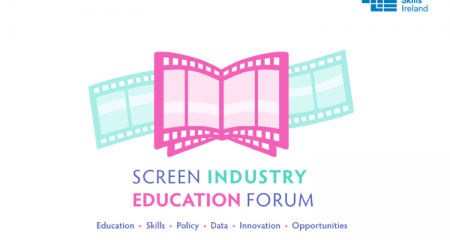In Ireland in recent weeks, national broadcaster, RTÉ, has not only been a news producer but a news item. The broadcaster, facing serious financial pressures, has indicated that it will aim to reduce its budget by selling off assets, reducing the pay of top earners and offering voluntary redundancies. As media educators, we are required to respond to such changes in the media sector in our curriculum design: it is our task to help students understand media and the media landscape they will enter upon graduation, give students skills in both practice and theory, and facilitate learning of media that is relevant and meaningful to students. There are also a number of broader pressures on third level educators in Ireland- some specific, some similar to those faced by educators elsewhere: third level education in Ireland is poorly funded in comparison to other European nation states. Irish third level education is increasingly expected to align itself with the demands of the economy; and because the demands of the economy change, Irish third level education is required to be flexible and responsive. In the context of media education, because media is dynamic, transforming and evolving, we find it necessary to reflect and review our practices and to assess the role and meaning of media education, particularly in regards to the experiences of graduates in employment and work. Consequently, during the summer of 2018 we undertook to carry out research on the experience of graduates of media education and to understand how they make sense of the relationship between media education and industry and work. What follows is an overview of the landscape of media and media education in Ireland, and a summary of some of the key findings from a survey conducted with media graduates that suggest there is far more that could be done at the level of education and employment to help graduates navigate and feel some form of ownership over their career routes and media work.
The screen sector in Ireland is made up of a small number of home-grown content producers and broadcasters as well as a growing number of private and foreign owned content producers. (Flynn & Tracey, 2019) The Irish screen sector demonstrates a dual desire to be both creative originators of content as well as a service sector for foreign owned and led content. An indigenous sector of print, radio and television sits alongside a globalised film, animation and television sector that is nurtured by state policy that encourages foreign direct investment in order to develop the economy and encourage employment. The state broadcaster, RTÉ, has been under pressure recently to significantly reduce its budget and there are, as in the UK, calls to downsize or privatise national public service broadcasting. In recent decades, a growing technology sector led by media giants Facebook and Google has provided some employment opportunities for graduates of media programmes In addition, there are many, particularly Dublin-based, media and marketing agencies that either employ directly or contract media workers. Internships and work-placed training schemes are sporadic and low in numbers in comparison to demand. Therefore, media education is perceived by students and aspiring media workers and professionals to take the place of such schemes. Media education has also been tasked, in state policy, with developing skilled workers for the media and creative industries(and ‘workers’ is the language used within such reports), thus blurring the line between education and training. It is within this context that third level media educational institutions sit and that media students and graduates operate.
In Ireland, as elsewhere, media education has a number of forms. However, it typically begins when students leave secondary education at approximately eighteen years old. Media education is not quite embedded into secondary education – especially in terms of practical education – and, for most students, their first encounter with full-time media education will be at third level. There are a number of one- or two-year vocational media, film and/or television production programmes that are practical and technical in focus and that are promoted as offering a gateway to the industry or to further education. The programmes are offered through ‘Post Leaving Cert’ (PLC- the Leaving Certificate is the final exam of secondary school) colleges of education that are smaller in size than institutes of technology or universities. Institutes of technology (ITs) offer undergraduate and postgraduate degrees and have historically been aimed at delivering technical and practical education in order to provide workers for industry. Hence, a good number of media, film and television programmes are offered through ITs, which tend to have the resources, facilities and staff that enables them to offer comprehensive learning and teaching in production. There have been recent moves to merge ITs to form Technological Universities. Finally, some universities in Ireland offer media, film and television programmes that have more of a focus on theory, history and traditional studies, with some such as our own Maynooth University combining this with practical and technical learning. We have based our study on the latter form of education that combines theory and practice in a general, rather than specialised, programme. There are, then, quite a number of options available to students wishing to study media-related subjects. However, as was apparent in our findings, students might be steered by social expectations or family pressures towards certain types of education (or, indeed, in choosing education over work in the first instance). In addition, their limited exposure to the study of media at secondary level meant that many were not fully aware of what a media programme entailed. In our research, we aimed to capture the journey of graduates of media programmes from school, through their degrees and into graduate life and work. We aimed to discover how they experienced a route that may have seemed defined and clear-cut (e.g. a media degree will result in a smooth transition to a media career). What follows is a brief overview of some of the more interesting findings.
Were graduates able to make connections between learning and doing?
In our survey responses, many of the graduates found difficulties in making the connection between education and work. They expected more resemblance between the experience of learning and the experience of work. In other words, while technical or practical skills may have remained similar across their education and their work, the processes, cultures and contexts of media work remained mysterious to them upon graduation. For example, one respondent stated that they didn’t quite understand the “nature, context or realities of what [they were] stepping into.” Another stated that they “didn’t understand how TV or Radio worked…how the newsroom ran and employed people or the different jobs I could do.” Their degree programme may have offered production skills but it wasn’t aligned enough with production cultures and work contexts. This points to some of the limits of higher education in delivering media education. As much as educators may try to reflect the work environment, education works to a very different timetable, with different demands and expectations and different deliverables. Media educators may opt to equip students with the current tools, technologies and work practices. However, this would be a challenging and time-consuming programme model that would leave little room for critical, philosophical and methodological approaches to the media industries that help students understand economic, cultural and institutional change. Third level education, after all, is limited in duration. Another respondent referred to a lack of familiarity with how the “industry works” and another indicated that they felt that they needed and expected a “training programme.” Again, here the respondent echoed the feeling that media education should more directly meet the needs of employers and provide practical work training. Graduates were able to recognise transferable skills as well as their use of more general learning in their work lives. One respondent – a teacher – noted their use of media studies in secondary school education. Audience studies and theory was used in work by a number of other respondents. Critical analysis was recognised as a skill valuable to media graduates in various facets of life. Presentation delivery, group work and communication skills were also regarded as valuable. Overall, then, students were able to recognise the value and relevance of non-media and general skills but wished for more understanding of specific work contexts, roles and skills. Students may have gained practical, communication and non-media skills but they struggled to feel prepared for media careers.
What was their experience of work inclusion and exclusion after graduating?
This ambivalence about media work was perhaps a reflection of the students’ experience in seeking work, facing barriers to entry and perceiving the industry as a ‘closed shop.’ As is typical in media work, graduates often relied on personal connections, informal networks, thus perpetuating the notion that ‘it’s not what you know, it’s who you know.” (O’Brien, 2016; Oakley & O’Brien, 2016) 20 of the 57 survey respondents said that they used networks and personal contacts to secure employment Others felt excluded and that they were outsiders despite their education. One respondent was quite direct in stating that “media work in Ireland is nepotistic, you probably aren’t allowed to teach it but I do think students need to be prepared for that.” Another stated that they didn’t have the ‘contacts’ necessary to secure work upon graduation. This was echoed by another respondent who thought that their media education would provide them with the connections necessary for a media career. One respondent reiterated this by suggesting that internships were the place to secure the connections crucial to media work: “One thing I learned very early in my career that [sic]building contacts and connections is so vital and doing an internship can give you that opportunity to get your ‘foot in the door.’” This concern with finding the right connections reproduces the ‘who you know’ status of the media industries and risks perpetuating inequalities and reproducing barriers to entry for those who don’t have access to such networks. And problematic for the educational sector is the devaluing that this places on education itself.
What do graduates feel about their careers?
Despite these concerns, media graduates very much valued media work and found personal, if not financial, satisfaction in it. Only half of the respondents reported feeling financially secure and the other half felt that they were either not or were barely financially secure. Some respondents felt that they had an understanding of this and accepted it as part of the nature of working in media, where a few others felt that they had not been prepared for this during their degree programme. Nonetheless, as has been found in other studies, students were drawn to the changeable nature of media work, the flexibility it afforded in terms of schedule and the opportunities for creativity. (Oakley, 2009) The latter, creativity, was cited often by respondents as one of the key benefits and rewards of media work. Creativity was associated with freedom and autonomy despite the ways that poor financial compensation may have limited autonomy (Banks, 2010). For example, one respondent said that “I love the freedom to be creative in work.” Another said they valued “the creative freedom.” Respondents also stressed the differences between ‘traditional’ work and media work. Media work was understood as challenging, as offering a different experience every day, as providing exciting new opportunities and variety in roles and in the content produced. More than any other section of the survey, the responses to the query about the value of media work were largely positive. More generally, the narrative was that, once graduates overcame the struggles of seeking out media work and accepted the financial or employment limitations of such work, they were rewarded with dynamic, interesting and important work that provided the primary means of satisfaction. Economic concerns were secondary to creative ones.
Our research has, more generally, demonstrated that the journey to media work should be more clearly mapped out for media students and graduates and in both education and in the media industries. Indeed, while media education was seen in our survey responses as responsible for undertaking the work of explaining the dynamics of the media industries, as well as the concepts and theories that framed media work and media cultures, the industry itself was not held as responsible for explaining these. Few respondents expected to learn about the media industries when working in them. Nonetheless, there have been efforts both by education providers and by industry to be more transparent about the nature of media work. However, in both cases, the tendency has been to concentrate on more established and recognised media careers and to neglect to identify and explain work available to new entrants or graduates. We see this as particularly important in a changing media industry where new forms of work are materialising regularly and new demands are, therefore, placed on educators and media graduates. We are continuing to unpack more data and to ask questions of the relationship between media education, media work, media policies and the media industries and to see if closer alignment between each would help and support those students and graduates who experience the effects of all.
Sarah Arnold is a lecturer at Maynooth University. She is preparing the book Television, Technology and Gender: New Platforms and New Audiences. Her previous books include Maternal Horror Film: Melodrama and Motherhood and the co-authored Film Handbook. Her research focuses on viewing spaces and environments of television and film, particularly in the context of gender and emergent technologies. She is a regular contributor to the Critical Studies in Television blog and RTE Brainstorm.
Anne O’Brien is a lecturer at Maynooth University. Her research focuses on gender and creative industries, women’s production work and representations of women in Irish broadcasting. She is the author of Women, Inequality and Media Work and has published in Media, Culture & Society; Feminist Media Studies and the Journal of Radio and Audio Media. She has also undertaken research on community media, in funded projects for the Broadcasting Authority of Ireland. O’Brien has produced a number of documentaries and series for broadcast and is a member of Women in Film and Television Ireland and was an appointee to the Broadcasting Authority of Ireland.
References:
Banks, Mark 2010. ‘Autonomy Guaranteed? Cultural Work and the “Art–Commerce Relation.” Journal for Cultural Research. 14(3), pp. 251-269.
Flynn, Roddy & Tracey, Tony. 2019. Historical Dictionary of Irish Cinema. London: Rowman & Littlefield.
O’Brien, David. 2016. ‘Are the creative industries meritocratic? An analysis of the 2014 British Labour Force Survey.’ Cultural Trends. 25(2), pp. 116-131.
Oakley, Kate & O’Brien, David. 2016. ‘Learning to labour unequally: understanding the relationship between cultural production, cultural consumption and inequality.’ Social Identities: Journal for the Study of Race, Nation and Culture. 22(5), pp. 471-486.
Oakley, Kate. 2009. ‘From Bohemian to Britart – art students over 50 years.’ Cultural Trends. 18(4), pp. 281-294.






